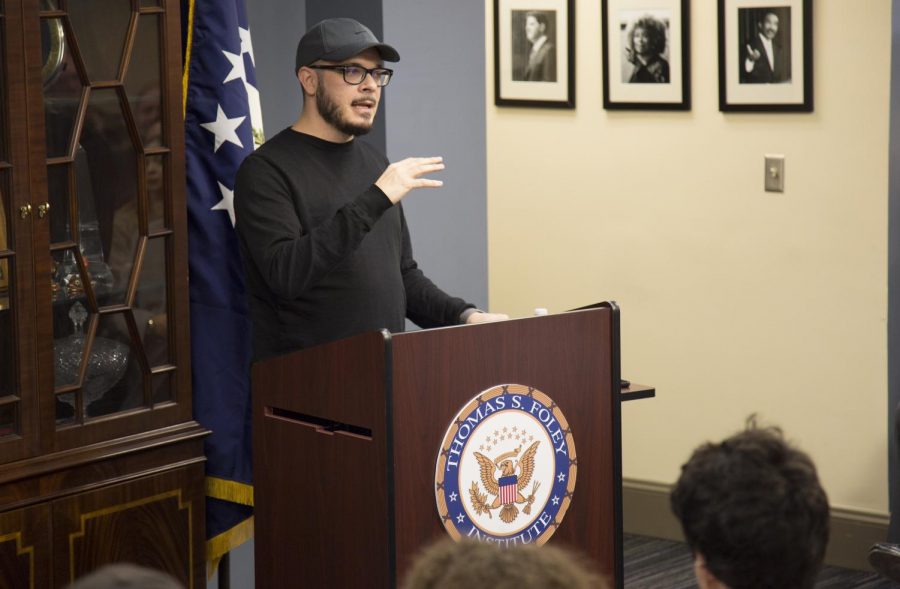King shows where football, activism intersect
Kaepernick felt shaken by incidents of police brutality
ZACH RUBIO | THE DAILY EVERGREEN
Shaun King speaking on his experience as a close influence in Colin Kaepernick’s kneeling for justice protest on Thursday.
January 19, 2018
Activist and writer Shaun King spoke about recent NFL protests and social media’s role in activism at WSU’s Foley Institute on Thursday.
“Social media is a horrible place to disagree,” King said, explaining that tone is lost over the internet, and one thing can be interpreted as another.
King said social media is a tool to communicate and there are some things about it that work well, but it can also cause significant problems. Despite that, he said, social media will be a big part of society’s story when looking back on the current generation.
King and former NFL quarterback Colin Kaepernick first connected through social media.
“As we bantered back and forth, he treated me like Google,” King said, recalling how Kaepernick, who followed King near the start of the Black Lives Matter movement, was very curious about activism and social justice.
King said Kaepernick was interested to know more about injustices that were happening and what was going on behind the scenes.
After being injured, Kaepernick had the opportunity to reflect on injustices happening around the world, King said, and was shaken by multiple police brutality incidents.
“Something awful happens every day,” King said. “But every day when something awful happens, it doesn’t hit you the same.”
King talked about Kaepernick’s decision to sit, and then later kneel, during the national anthem and how he ceased to participate after feeling like the words were a lie, that America was not the land of the free and the home of the brave.
Kaepernick wasn’t trying to start a movement, King said. He was just bothered by police brutality in America and did not feel like the anthem lived up to its motto. He wanted to share solidarity with the families who had been affected by injustices.
“He really just was a very reflective man who just felt like, ‘I feel weird standing up for this,’ ” King said.
King said because of the way social media works, and the way the news is told, a lot of people saw Kaepernick as an arrogant and aloof athlete, who hated soldiers and had no idea how disrespectful he was being or who he was offending.
“[It’s] so peculiar to hear people talk about you that’s not at all reflective of your heart,” King said.
For Kaepernick, he said, it wasn’t about hashtags or headlines. He was just a guy whose heart was hurting and had no idea how to make a difference until a spur-of-the-moment decision to take a knee became a movement.
King said to this day the issue is split between two demographics. Race plays a factor, but also age, as younger people identify more with Kaepernick than older people.
He also mentioned how different people get their news from different sources which can lead to being in a “bubble.”
“In spite of all this social media, our bubbles are thicker and thicker,” King said.
King encouraged the audience to try their best to break out of their bubbles. He said it’s OK to think people are wrong and disagree, but at least make an effort to try and understand other views.
“The world is bigger than your Facebook page,” King said.
He also noted that protests need to continue, but they alone rarely make change, so it is also important to look at how to change policies. He said one needs to be on the inside to make change happen, and he thinks society will start to see more people taking this approach.
“It’s hard to know a moment in history when you’re in it,” King said.








